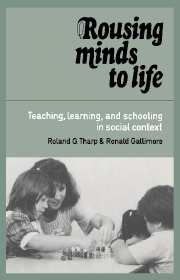Book contents
- Frontmatter
- Contents
- Acknowledgments
- Introduction
- Part I Teaching, schooling, and literacy: a unified theory of education
- 1 The redefinition of teaching and schooling
- 2 A theory of teaching as assisted performance
- 3 The means of assisting performance
- 4 The social organization of assisted performance
- 5 Language, literacy, and thought
- Part II Practice
- References
- Author index
- Subject index
5 - Language, literacy, and thought
Published online by Cambridge University Press: 05 June 2012
- Frontmatter
- Contents
- Acknowledgments
- Introduction
- Part I Teaching, schooling, and literacy: a unified theory of education
- 1 The redefinition of teaching and schooling
- 2 A theory of teaching as assisted performance
- 3 The means of assisting performance
- 4 The social organization of assisted performance
- 5 Language, literacy, and thought
- Part II Practice
- References
- Author index
- Subject index
Summary
After the theory of teaching, and after the theory of schooling, we are now prepared to consider the third leg of a theoretical tripod: What shall the schools teach? The question is addressed to a higher level than one of content; the answer should be provided at a level inclusive of content. The answer is that schools should teach students to be literate in the most general sense of the word – capable of reading, writing, speaking, computing, reasoning, and manipulating visual as well as verbal symbols and concepts. Together, the three theoretical legs of teaching, schooling, and general literacy support a theory of education.
For coherent education to exist, all three legs must be supportive. We have already argued that teaching cannot be expected to occur unless schooling itself is organized in ways that support teaching. Likewise, literacy will not be achieved unless teaching is present. Literacy itself, as the basic goal and value of education, requires that schools teach; teaching, as the indispensable process by which literacy is achieved, requires that schools be organized as teaching institutions; schooling, if reorganized to allow teaching, will create a literate citizenry. This concept of the three legs of a tripod emphasizes the interconnectedness of these considerations: If one collapses, all fall down.
Language and meaning
There is a level at which theory can guide education, no matter whether the schools choose to teach differential equations, the poet's “pretty kings of France,” or the state constitution of Nebraska.
- Type
- Chapter
- Information
- Rousing Minds to LifeTeaching, Learning, and Schooling in Social Context, pp. 93 - 112Publisher: Cambridge University PressPrint publication year: 1989



